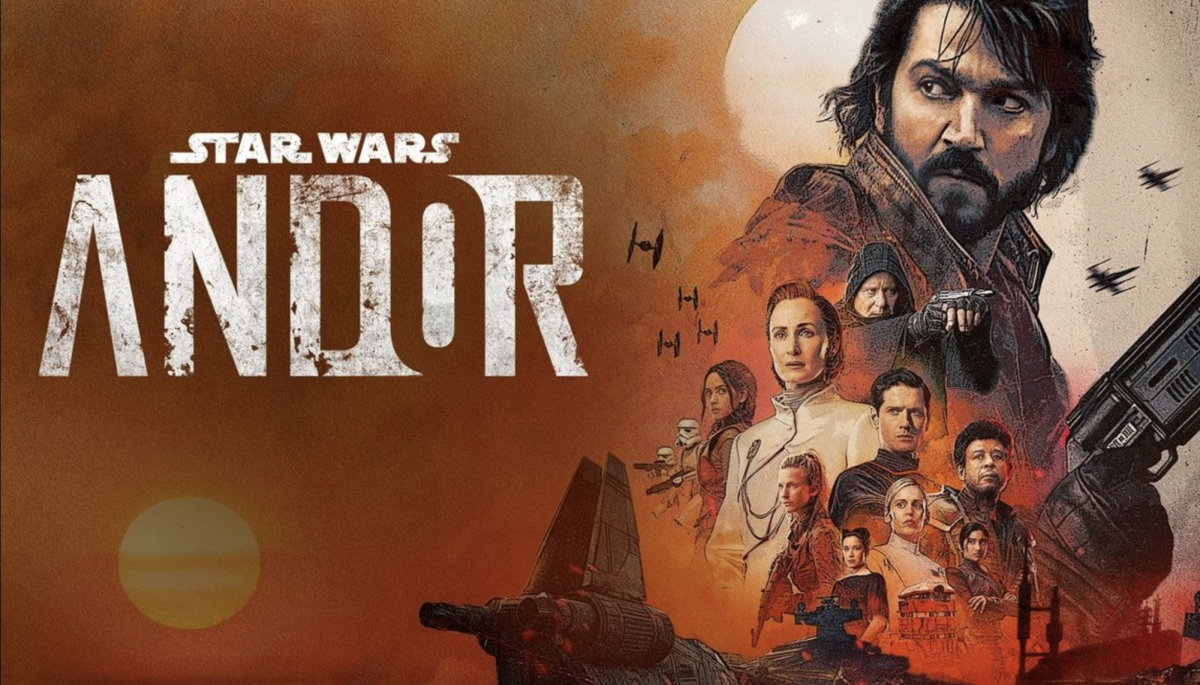When one is prompted to think of Star Wars, what first comes to mind is likely battleships and lightsabers – the ultimate fight between good versus evil, set on the backdrop of a vast galaxy. It has established itself as a decades-long franchise of beloved characters and pop-culture iconography, but its recent products have decayed its legacy, slowly declining in overall quality and interest. Controversial films, empty storytelling, and clear cash-grabs made up most of Disney’s rollout to the Star Wars brand, and many fans have wondered if they would ever see good Star Wars ever again.
Andor is just that – a diamond in the rough. A profound, character-driven story of complex nature and nuance within a world of capitalist-driven art. A story that revolves around the average human rather than the archaic hero, that delves deep into the grayness of morality within a world of fascistic overreach. A story that doesn’t rely on the name brand of the franchise, or rides the hype of fan-favorite characters – rather, embedded with a mature and competent storyline, a story to tell, and a message to spread.
At its core, Andor tells the story of Cassian Andor, the rebel intelligence officer first introduced in Rogue One: A Star Wars Story (2016). The show traces Cassian’s journey from a cynical thief to a committed rebel fighter, but it doesn’t present his transformation as the typical hero’s arc. The narrative unfolds at a deliberate pace, with rich character development and a focus on building tension through political intrigue and covert operations. This slow-burn approach is a refreshing change from the more action-oriented or spectacle-driven storytelling often seen in mainstream franchises.
Whereas some Star Wars shows focus on familiar archetypes and larger-than-life personalities, Andor highlights its richly developed, multidimensional characters. Cassian Andor himself is not a hero in the traditional sense. The audience sees him lie, steal, and kill in cold blood. He’s a morally gray figure whose personal journey is one of growth, regret, and realization. His transformation is not one of idealism but pragmatism, intertwined with the story as he learns the fight for freedom is less about individual glory and more about collective sacrifice. He is the axis in which the story revolves, a mirror for refracting ideologies, and the audience’s eyes to view the galaxy.
But what really sets Andor apart is its ensemble of supporting characters, each of whom is given their own unique motivations and arcs, rather than a hollow exoskeleton of an archetype. Mon Mothma (Genevieve O’Reilly) toes the balance between her role as a senator and her secret involvement in the rebellion, overcome with growing suffocation as the Empire infiltrates every aspect of her life. Luthen Rael (Stellan Skarsgård) is a morally ambiguous operative whose cunning and ruthlessness are revealed gradually, offering one of the show’s most intriguing and memorable performances.
He acts as an integral character in the development of the fledgling rebellion, but he is not painted as a virtuous saint. Rather, he is ingrained with deep complexity and moral questioning. Often in films, the “good guys” must toe a moral line in order to stay consistent with their position as righteous people, staying polite in the fight for a better tomorrow. Andor counteracts this notion, disregarding the need to play by the rules in the fight for justice. The Empire doesn’t, so why should they? It shows the sacrifices one must make so that others will be able to see a better tomorrow, be it physical or in conscience.
In addition, characters like Vel Sartha (Faye Marsay) and Nemik (Alex Lawther) give voice to different facets of the rebellion and all of the partisan fronts that exist within it — from blind idealism to aggressive radicalism — showing that even within a common cause, there are vast ideological divides.
One of the standout features of Andor is its portrayal of the Empire not as an abstract evil but as a bureaucratic, authoritarian machine that operates through institutions, surveillance, and propaganda. It is made up of competent and intelligent people, not clumsy stormtroopers that can’t ever seem to hit a target. The show’s depiction of imperialism feels startlingly realistic, drawing on historical and contemporary political struggles to create an oppressive, believable regime.
Characters like Dedra Meero (Denise Gough), a ruthless Imperial officer, and Syril Karn (Kyle Soller), a zealous former security officer, bring a sense of real-world ambition and human fallibility to the Empire. Their internal motivations—ranging from ambition to ideological fervor—add layers to the familiar narrative of good versus evil. The audience can sympathize with Dedra’s desire to prove herself as a woman in a male-dominated field, or with Syril’s overbearing and passive-aggressive mother. It’s not just about “shooting the bad guys”; it’s about understanding how ordinary people can become complicit in the machinery of a totalitarian state.
Another component of the show’s brilliance is that while Andor embraces a more grounded, gritty aesthetic than many of its Star Wars counterparts, it never loses the scope and grandeur that defines the franchise. The show’s production design and cinematography are stellar, creating an atmosphere of oppressive tension without sacrificing the visual beauty that fans have come to expect from Star Wars.
The world-building is meticulous, with the show exploring new corners of the galaxy — colonized lands rich with culture, corporate hubs of cubicles, and sterile Imperial facilities. In an industry so reliant on new-technology like the Volume, locations like Ferrix – filmed entirely on-location, makes for a breath of fresh air while viewing. The lack of CGI and attention to seemingly trivial details helps to generate a life-like community intertwined by close-knit workers, distinctly characterized by its unique traditions and culture. The story treats the planet itself as an entity, brought to life by the people that inhabit it.
The care put into each detail is a testament to why the show is so critically acclaimed. It takes its time to unravel the threads, tying the theme into subtle nuances rather than stale dialogue and overused tropes. Some critics have argued that it is too much of a slow burn to start, as the storyline is grouped into multi-episode arcs. That argument could be easily counteracted, as the first few episodes not only lay the groundwork, but pay-off tremendously in the final episode. There is also no lack of grandiose moments, culminated by exciting and well-directed action scenes, as well as some of the best monologues in modern television.
Another argument against Andor is that it’s “too real” for it to be categorized as a Star Wars product. It can be understandable that those acclimated to the traditional lens of the franchise feel this way. After all, Andor never once mentions Jedi or Sith, and the only time Empire Palpatine is mentioned is in off-handed comments. The series has always existed on a higher narrative plane, but Andor takes a look at what’s beneath all of the spectacle. It answers all of the questions of; how does a fascist society govern? How does it affect the everyday person? What does it take to be radicalized? And most importantly – how can they fight back?
At a time when the world feels increasingly divided and politically charged, Andor subverts the escapist lens of fantasy sci-fi and contextualizes it as a tangible thing. It’s a show that asks its viewers to think critically, to engage with its world on a deeper level, and to question the narratives we’re told—both in fiction and in reality. In the end, Andor succeeds because it does what all great stories should do: it challenges us, entertains us, and makes us think. It is Star Wars, yes—but it is also something more. It is a show that redefines what Star Wars can be, proving that even in a galaxy filled with hyperdrive engines and blasters, there’s still room for profound, sincere human drama.






























































































